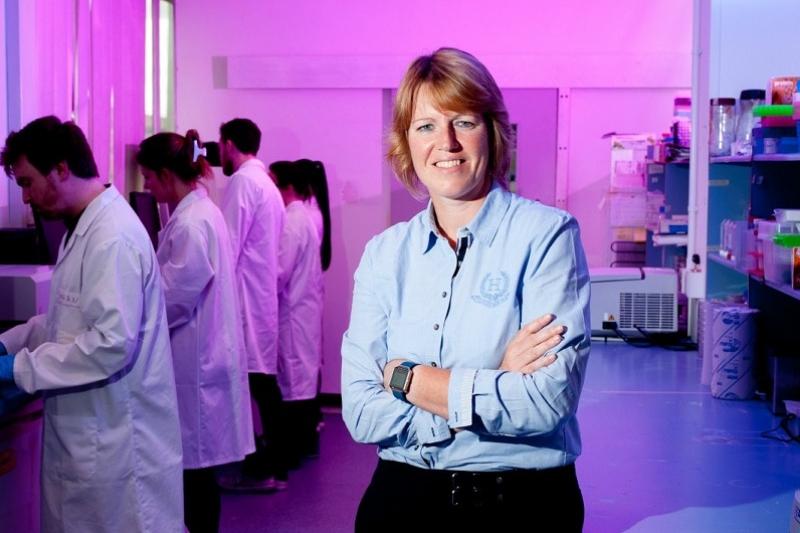How the Government's business support packages are helping UK companies

Alongside the Job Retention Scheme – which has allowed companies across the UK put staff on temporary leave with 80% of wages covered up to £2,500 a month by the Government – there has been a range of support schemes rolled-out by the Government to help businesses.
From the low-risk Coronavirus Business Interruption Loan Scheme and business rates holidays to help with cash flow, to grants to support the response to Covid-19, struggling companies have been able to access vital funds in a time of crisis.
Here is how three UK businesses have benefited…
Broadwaith: Anglesey, Wales
“You put your blood, sweat and tears into [it]… It’s everything in a way,” says Dafydd Roberts (pictured top) of his Anglesey-based clothing company, which was founded by his mother 30 years ago.
Menna Roberts had always had a keen interest in textiles and started out making towels as presents. She grew her passion into a business and named it Brodwaith – embroidery in Welsh. Today, it embroiders logos – and prints – on to garments for a range of organisations, including schools, and also manufacturers workwear.
Dafydd joined in 2007. Enthusiastic, he recalls how initially his mother had to rein him in. Ten years on, however, and the roles had entirely reversed. “It was me having to rein Mum back in, going: ‘Oh steady now, we can’t afford to do that!’”
Menna passed away in 2018, leaving "a huge void", Dafydd says. He took over running the business with his wife, Ruth, and went on to lead it through what was already a challenging period – they had moved into a larger premises some years earlier and were still working through the costs.
But on experiencing a more successful winter than anticipated in 2019, the team were looking forward to the new year – in 2020, they could “really turn the corner”. Then the pandemic struck.
“Sick, to be honest with you”, is how Dafydd describes he felt on hearing talk of a lockdown. Orders were declining and concern growing rapidly as to how the business could pay wages, suppliers and even the basics. Dafydd began to consider his options. “At that point, I couldn’t see any future,” he says.
His outlook changed when the Government announced the Job Retention Scheme. “There was some light,” Dafydd says. “It was fantastic. A very fair type of scheme.”
He also signed up to business rates relief and the Small Business Support Grant Fund, which has helped pay part of the company’s running costs while it experiences little trade.
As director of the company, however, Dafydd refused to furlough himself and set to work ensuring that what little business they did have was successfully carried out. That entailed answering the call to source PPE for the NHS and provide scrubs for it as well.
Brodwaith had previously designed the garments for care homes and local authorities, so it had knowledge of how to make them in-house, and could adapt the production line to suit the specifics. “When the demand was there, we were able to put our hands up and say: ‘We’re in the position to be able to make these!’”
Dafydd approached some of his furloughed staff and asked whether they would consider returning to work. “They [replied]: ‘Please can we come back, yes. When can we start?’” he says.
With strict social distancing, hand sanitising and hand-washing measures in place, he reopened the factory. While relieved some of the business has returned to partial normality, Dafydd says it is a bubble. “When you’re in the factory, the machines are going, the radio’s going… and then you walk through the double doors into the schoolwear shop and the lights are off, and there’s nobody in. That churns your stomach because it’s like reality.”
The future of Brodwaith, like many companies around the UK, remains uncertain. “We do a lot of work for the tourism industry – none of that’s going to be there this year,” Dafydd says.
However, with NHS scrubs and school uniform orders still coming in, he says the business can carry on for the time being.
He calls the Government’s financial assistance during this time a lifeline. “We are not a business with huge cash reserves, therefore getting the support has been crucial,” he adds.
pHion Therapeutics: Belfast, Northern Ireland

Belfast-based pHion Therapeutics, developers of drug delivery technology, specialising in viral infections, has been awarded £50,000 to help work on a drug to combat Covid-19.
The funds have come from the new investment into the Fast Start grant programme, earmarked to drive forward technological advancements to deal with the pandemic and its lasting effects.
“Vaccine therapies are working towards preventing people getting the disease, but for those people that have got the disease and the virus is replicating uncontrollably, we need something to help tip the balance in favour of the patient,” explains professor Helen McCarthy, CEO and founder of pHion Therapeutics, pictured above.
Research will be focused on reducing the expression of the ACE-2 receptor, which is the entry point for coronavirus to get into the cell.
“A lot of the Government support programmes, which have been very generous and absolutely needed in the current times, haven’t been suitable for a company like ours, which is an early stage research, R&D-intensive business,” acknowledges chief operating officer Darach Neeson. “So for there to be additional grant funding to made available from Innovate UK, through this, and also other Covid grant funding opportunities, is greatly appreciated by a business like ours.”
Stobo Castle Health Spa: Peeblesshire, Scotland

Without the Job Retention Scheme, Stephen Winyard, chairman of Stobo Castle Health Spa, acknowledges that he would have likely needed to have made much of his 200-strong workforce redundant.
“From a turnover of £8.5 million annually, we went to zero overnight,” Winyard notes, explaining that he’s also made the most of the business rates holiday and the Coronavirus Business Interruption Loan Scheme (CBILS) to keep the business going while the hospitality sector is closed.
“There are maintenance costs involved with a 19th-century building. It [needs] to be heated and maintained,” he says. “We're actually using this opportunity to address certain essential maintenance and refurbishment projects.”
The majority of staff have been furloughed, but Winyard has kept a few maintenance and security employees on oversee the premises.
Small business grants are devolved to national governments. Check with your local authority what kind of grant you may be eligible for. To find out more details about the financial support available go to gov.uk/coronavirus/business-support and to see if your business is eligible go to gov.uk/business-coronavirus-support-finder
Subscribe to Independent Premium to bookmark this article
Want to bookmark your favourite articles and stories to read or reference later? Start your Independent Premium subscription today.